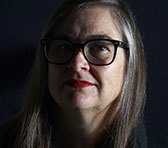11 December 2017
What it means to be a composer today
 Image: Cat Hope
Image: Cat Hope Art music practice in today's Australia is a rich and diverse field, and pathways to the profession via education and further professional development are fluid and varied. The language we use, on the other hand, doesn't accurately reflect our contemporary practice. We also need to be able to communicate effectively with those outside our sector.
This is why the AMC is commissioning a series of articles about being a composer today, for publication over spring and summer 2017-2018. We're calling for new, bold and positive definitions and redefinitions of the word 'composer' in our contemporary context. We invite you to respond to these articles with your commentary, here in Resonate, and on social media.
So far in the series: articles by Cat Hope, Cathy Milliken, Gordon Kerry, Jim Denley. See also responses by Rhys Gray (Resonate) and Andrew Ford (Inside Story).
Being a composer means lots of different things to lots of different people. People from different training, cultural and social backgrounds. People with different desires, intentions and dreams. People who can spend all day thinking about a new composition, who work it out as they play, or who have a flash of inspiration that is rendered in a moment. I couldn't presume to say what it is for everyone, and I don't think anyone else should. I think there are too many assumptions around the word 'composer'.
But what all music creators have in common - songwriters, electronic music makers, orchestral composers, sound artists, improvisers and so on - is the idea. A good idea, not just an astute craft. Craft can render an idea into effective reality, but the craft and the idea need each other. This rendering starts with someone, the composer - but continues on a trajectory with the aid of performers or sound engineers. It is a shame we separate composition from its performance so determinedly - two creative acts intertwined in the creation of a work of music.
We sometimes forget that composing is not always a singular act. It is not always the lonely figure, looking out the window for inspiration so that the notes unfurl on the stave. Composing can be messy and collaborative, undertaken by single-minded creatives but also people who just love playing with their friends. It's made of accidents and mistakes as often as plots and plans. It absorbs the weight of history at the same time as it breaks away from it. It shouldn't be limited by career aims, tools or constraints - rather, it must be allowed to bloom in conversations, workshops and improvisations. It should be of us, of our time. We belong to a community of music makers, listeners and scholars, we are all in this together and will be stronger if we work with and acknowledge each other.
Rather than redefine the word composer, with all its implications, I have been toying with the idea of a 'music creator'. This permits the contributions of performers and other music enablers as a team, and people who make music outside the classical realm. Music creator harks back to the days before notation, when music was shared through doing - making sound and remembering it. But ultimately, it's what we do with the music we make, rather than what we call the process of making it, that matters. It is time to acknowledge the broad spectra of activity that we engage with as music, and come to terms with the idea that composer may perhaps no longer be the right word at all.
Other articles in the series
Cathy Milliken: 'On composition' (Resonate 29 January 2018)
Jim Denley: 'We Compose' (Resonate 17 October 2017)
Gordon Kerry: 'There are composers, and people who compose' (Resonate 17 October 2017)
© Australian Music Centre (2017) — Permission must be obtained from the AMC if you wish to reproduce this article either online or in print.
Comments
Be the first to share add your thoughts and opinions in response to this article.
You must login to post a comment.